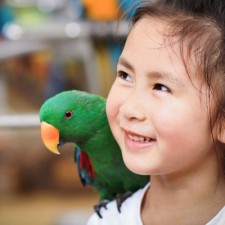Do you have a pet bird? Polly can make a very cute and charming pet! Just like any other type of animal, birds have some specific care requirements. Below, a Lafayette, LA vet discusses some key points of keeping your winged pal healthy.
Good Nutrition
Proper nutrition is crucial to Polly’s health and well-being. For her main meals, your feathered buddy can have a commercial bird food that is suitable for her species. You’ll want to supplement this with other appropriate foods, such as fresh, bird-safe fruits and veggies. Always research new foods before giving them to your colorful pet, to be sure they are safe and suitable for her. Ask your vet for specific dietary recommendations.
Proper Habitat
Making sure your pet is comfortable in her cage is very important! Birdcages are not one-size-fits-all, so do some research before shopping to determine exactly what size and style of cage will best suit your winged buddy. Bigger is always better when it comes to birdcages, so get the biggest cage you can afford. To keep Polly happy and comfortable, offer her a variety of perches and fun toys, and be sure to keep her cage clean.
Household Hazards
Many common household items are very dangerous for birds! Be careful not to expose Polly to any harmful fumes, such as aerosol sprays, cigarette smoke, perfumes, and the vapors from chemicals or cooking. Ceiling fans; open water, such as a full sink or bathtub; windows; drapes; small objects, such as buttons; and drafts are also dangerous to our winged friends.
Veterinary Care
Just like any other animal, birds need proper veterinary care. Make sure Polly visits the vet regularly for her checkups! At home, keep a close eye on your feathered buddy for any signs of possible health problems. Some possible signs of sickness in birds include tail-bobbing, sitting in unusual positions, lethargy, dizziness, aggression, and feather plucking.
A red, inflamed cere; discharge from the eyes or beak; open-mouthed breathing; and swollen eyelids are more warning signs. Any changes in your winged pal’s vocalizations, behavior, beak appearance, waste, appetite, or thirst can also be red flags.
Contact your vet immediately if your bird develops any of these symptoms, or if she just doesn’t seem like herself.
Do you have any questions about your bird’s health or care? Call us, your Lafayette, LA animal hospital, today!

